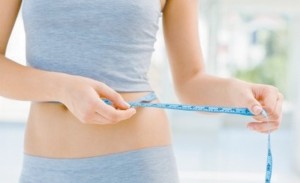By Alan J. Bauman, M.D.
 Face it. We’ve all been there. Maybe it was when your pants felt a little tight or your shirt didn’t button smoothly. “Diet time,” you declared enthusiastically, and you immediately went on a crash diet to shed those unwanted pounds fast.
Face it. We’ve all been there. Maybe it was when your pants felt a little tight or your shirt didn’t button smoothly. “Diet time,” you declared enthusiastically, and you immediately went on a crash diet to shed those unwanted pounds fast.
You succeed at shedding the unwanted weight, but in the process you lost important vitamins and minerals. Thinning hair is one of the first effects of this nutrient starvation. Hair loss may not be immediate, but a few weeks or months later, I’ll bet you noticed more hair strands on your brush and comb or in the shower drain, and less of it on your head.
How did that happen? The problem isn’t that you went on a diet. It’s that you tried to do too much too quickly, and your body simply didn’t have the resources to counter the sudden decrease in nutrient intake. In short, crash dieting draws on your body’s vital resources, and pretty soon you’re running at or near empty.
This type of hair shedding, telogen effluvium, forces some hair follicles to shed their hair strands and go into a prolonged resting phase during which time no new hairs grow. It may take a long time for hair to recover – often six months to a year.
One crash diet is bad enough, imagine the effects of serial dieting. You know the drill. Feel fat. Diet hard. Slip up. Eat. Feel fat again. Crash diet again. Slip up again… and so on. In many cases, the effects of “yo-yo” dieting is permanent. If you’re a reasonably healthy person, your body will recover but your hair may not. Often, your hair reacts to the stressful nutrient depletion by simply giving up.
So what’s to be done? First, make a commitment to go about dieting slowly and sensibly in a way that gets you to your weight goal without doing damage to yourself.
Start by cutting out, or at least cutting down on, foods you know are high in calories or ones that have little or no nutritional value. Ice cream, for instance. Or candy. Or donuts. Limit yourself to one small bite. That alone should be good for at least a pound a week for the first couple of weeks.
Make sure you eat foods rich in iron and proteins (the internet has loads of good suggestions) and enough vitamins, particularly Vitamins A, B, and C, all of which are known to be important for your hair’s health. Increase consumption of salmon (which is loaded with omega-3 fatty acids), dark green vegetables, and nuts (which are admittedly high in calories but full of important vitamins).
If you must, try the Mediterranean Diet, it is considered near perfect in terms of overall health (including hair health) and longevity. It consists of eating primarily plant-based foods such as fruits and vegetables, whole grains, legumes and nuts ….plus (I kid you not) red wine in moderation. There is plenty of in-depth information published and available out there on healthy diets.
Scientifically developed treatments like Viviscal Pro and Biotin (also known as Vitamin H or B7 support the growth of thicker, healthier hair.
If you believe your hair has already gone past the point of no return or is fast approaching it, you should definitely consult a Board-Certified Hair Restoration physician like Dr. Alan J. Bauman of Boca Raton. He can help assess the risks for hereditary hair loss, as well as scientifically track and monitor the hair’s progress and prescribe a course of treatment in more serious cases.
The first thing you should do is find out exactly what’s going on in terms of any possible hair loss. You need an accurate, numerical base line measurement so you can track the extent and rate of any hair loss you may experience in the future.
The way to do this is with a HairCheck® measurement. This is a simple, painless non-invasive process that measures and tracks the amount of hair growing in a given area of your scalp, and assigns it a number called your Hair Mass Index or “HairNumber.”
A highly sensitive hand-held ‘trichometer’ measures the hair caliber and density together and expresses them as a single number. The instrument can also
measure hair breakage which can occur when the hair is weakened by unhealthy dieting. It can also be used to quantify the degree of hair breakage from harsh hair care regimens.
Tracking these numbers over time can help determine the extent and rate of your hair loss and/or breakage, and provide information needed to decide on a treatment plan.“The data we collect provides people with actionable information by combining scientific hair tracking measurements with a series of non-invasive, easy-to-follow hair regrowth plans and options,” explains Dr. Bauman. “It also helps us track the early, subtle improvements in your hair when you first begin a treatment regimen.”
The moral of the story is that dieting, like most things, should be done in moderation. Way down then way up then way down again works great for a roller coaster, but not for your body’s – or your hair’s – health. Which, when all is said and done, is really all that matters.
About Dr. Alan J. Bauman, M.D.
Dr. Alan J. Bauman is the Founder and Medical Director of Bauman Medical Group in Boca Raton, Florida. Since 1997, he has treated nearly 15,000 hair loss patients and performed over 6,000 hair transplant procedures. An international lecturer and frequent faculty member of major medical conferences, Dr. Bauman’s work has been featured in prestigious media outlets such as CNN, NBC Today, ABC Good Morning America, CBS Early Show, Men’s Health, The New York Times, Women’s Health, The Wall Street Journal, Newsweek, Dateline NBC, FOX News, MSNBC, Vogue, Allure, Harpers Bazaar and more. If you have a question about hair loss or thinning hair, visit his website www.baumanmedical.com or email doctorb@baumanmedical.com to learn the ways modern medical treatments can protect, enhance or restore your own living and growing hair.
Check Also
RejuvaNATION MedSpa: Elevating Men’s Health to New Heights
Embark on a Journey to Revitalize Your Vitality Rediscover the joy of a spontaneous sex …
 South Florida Health and Wellness Magazine Health and Wellness Articles
South Florida Health and Wellness Magazine Health and Wellness Articles




